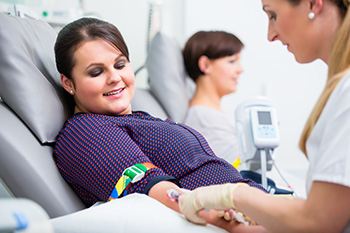
The cell therapy market has seen substantial growth in recent years. According to the Alliance for Regenerative Medicine, there were 1,052 clinical trials underway at the end of Q3 2019 — 636 of which were classified as cell therapies. Likewise, the U.S. Food & Drug Administration (FDA) announced in January 2019 that it had 800 investigational new drug (IND) applications for cell and gene therapies on file and expects to receive 200 new applications annually beginning this year.
To date, most of these “living drugs”, used as treatments for a wide range of indications, are collected from autologous donors—that is donors, who are donating for themselves. However, in order to bring these life-saving therapies to greater number of patients, companies are now moving towards using cells from allogeneic donors.
Autologous Versus Allogeneic Therapies
Autologous cell therapies are manufactured using cells from the patient being treated. The two currently FDA-approved CAR-T therapies (Kymriah and Yescarta) are made using T cells collected from a patient through leukapheresis, genetically engineered to target the cancer cells, and infused back into the patient.
Allogeneic cell therapies, on the other hand, are manufactured using cells from unrelated donors. Such allogeneic cell therapies are still in the research phase, but the cell types being investigated include, among others, mesenchymal stem cell (MSC), CAR T-cells, and NK cells. There are several potential advantages of allogeneic over autologous cell therapy products.
Advantages of Allogeneic Over Autologous Cell Therapy Products
- Greater cell functionality. T-cells from healthy donors may be more functional than autologous T-cells, which may suffer from cancer-associated T-cell dysfunction.
- Off the shelf availability and accessibility. Allogeneic T-cells can be readily available, compared to a manufacturing time of 3-4 weeks for a custom, patient-specific product. This is a major advantage because irrecoverable disease progression may occur while awaiting autologous cell therapy manufacture.
- Off the shelf cost-effectiveness. Allogeneic cell products could theoretically be mass manufactured for use by multiple patients and are thus may be less costly to manufacture than a custom product for each individual patient. The autologous cell therapy products Kymriah and Yescarta are currently priced at $475,000 and $373,000, respectively.
- Less product variability. Consistency and standardization of key attributes like cell number, viability, CAR expression and memory phenotype is not possible with individual patient products as it would be with an allogeneic product. For example, many patients are heavily pre-treated and may be lymphopenic, therefore making collection of enough cells problematic.
- Lack of tumor cell contamination. Cancerous cells can be transduced with the CAR construct and lead to relapse, which should not be a problem with cells from a healthy donor.
Rejection of and graft versus host disease (GVHD) caused by cell therapy products are still concerns, but some cell types like mesenchymal stem cells and NK cells may evade or suppress the immune system such that rejection and GVHD may not be significant risks. T-cells typically require HLA matching to prevent rejection or GVHD, but methods are being developed, such as knocking out the TCRαβ receptor, to circumvent the need for HLA-matching.
Ongoing development of allogeneic cell therapies has led to an increased demand for healthy allogeneic donors. Partnering with an organization experienced in both collections and allogeneic donor recruitment can benefit your project.
Comprehensive Cell Solution Can Support Your Autologous & Allogeneic Collections Needs
Do you need autologous or allogeneic donations for your training, bench research, or clinical trial? Contact Comprehensive Cell Solutions™ (CCS).
CCS conducts over 7,000 apheresis procedures every year and has provided 18,000 cell therapy products to hospitals, biotech, pharmaceutical companies and other organizations nationwide. CSS leverages the New York Blood Center’s (NYBC) strengths of innovation, flexibility, mobility, creativity, and quality to provide reliable apheresis and cellular collections based on your organization’s unique needs. NYBC is named a BeTheMatch® BioTherapies Center of Excellence.
Collections can be performed for donors recruited by NYBC or by you. A variety of cells and cellular components can be provided, including mononuclear cells, hematopoietic stem cells, granulocytes and more. The donor eligibility of allogeneic donors can be determined by conducting a physical exam, reviewing donor health history for disease risk factors and infectious disease testing. It is critical to have a partner with experience and expertise to ensure collection of source material that meets safety parameters.
Learn more about CSS’s apheresis collection services. For answers to common questions regarding high-quality cellular starting material